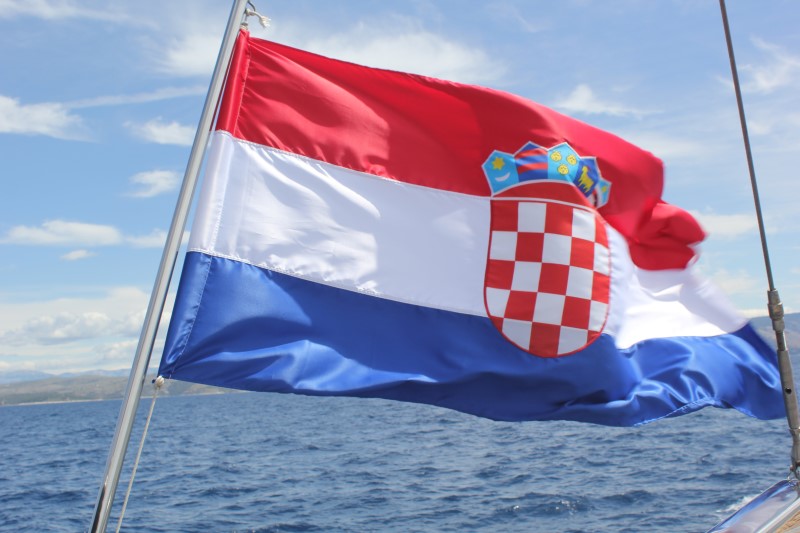March 6th, 2018, are you a foreigner about to move to Croatia and try your hand at learning Croatian? After my own struggles, I had an epiphany that there are the motions (and emotions) we go through BEFORE we learn a language. So, be prepared for the five stages you might go through before you really begin to learn Croatian.
Learning a language is hard. Really f****n hard. If you are one of those gifted people who can pick up languages in a matter of months, then kudos to you – really, this is awesome. But, for the rest of us, learning a language is one of the more vulnerable, daunting and downright frustrating experiences of life as a foreigner in a new country.
My first summer living in Croatia, my Croatian husband was at sea and I was left to fend for myself with no friends, no family and a handful of Croatian words in my vocabulary. It was one of the more difficult experiences of my life to date; I was confronted with a lot of things about myself and not being able to speak Croatian was just the icing on the upside-down cake.
Am I a language guru, do I speak Croatian beautifully and fluently? No. I am ashamed to say that after three years living here, I still do not speak fluent Croatian. Then what gives me the audacity to write on the topic of learning a language? Well, like anything in life, I believe we learn the most from our mistakes and challenges. So, I thought if I highlight my struggles maybe, just maybe, you can avoid making the same mistakes. Or at the very least, you will look back on this and think “thank God it’s not just me!”
Moving to Croatia was not my first experience with a foreign country or language, I had travelled all around Europe – quite independently for the most part and nothing ever seemed too difficult or confronting. However, living in a foreign country is a whole other ball game and there is not much that can prepare you for it. When I was travelling, language barriers simply led themselves to humorous encounters and good travel stories but when you live in a foreign country, it feels heavier for some reason and can lead to feelings of inadequacy and isolation.
I remember my first summer, one day I went down to the local supermarket for a few basics – bread being one of them. Unlike in New Zealand and most Western countries, there aren’t many options for pre-packaged bread, it’s all fresh (I love this about Croatia) and sitting behind a counter, so you need to ask for it.
It just so happened, that on this day, I was feeling extremely low, I went to ask for bread but the woman behind the counter didn’t speak English and I realised I didn’t know the word for bread in Croatian. That was it, that was my breaking point. My cheeks reddened, my eyes pricked and I had to escape the shop before I burst into a flood of hot tears in front of the bread lady – who had done nothing wrong.
Anyway, I learned the word for bread – “kruh”, got over this incident and slowly built my basic vocabulary for Croatian. In the beginning, whenever I spoke a few words and sentences to locals in Croatian, my efforts were met with “bravo”, now, after 3 years here, I am at the point where my efforts are instead met with “još ne pričaš Hrvatski (you still don’t speak Croatian)?! And, they have a point.

I had an epiphany that there are stages (very similar to the stages of grief) that we go through before we really begin to learn the language. Before I go any further, I will state for the record – that yes, we all learn differently but after speaking with a few other expats/immigrants, it seems that there are similarities in our experiences. So, here they are, ‘The 5 Stages BEFORE You Learn a Language’ (to be taken with a grain of salt).
1. Frustration
Oh, frustration will arise in a number of ways but is mostly to do with our inability to communicate what we want, when we want – refer to the ‘bread’ example above. Even though my Croatian is much better now, I am still very limited in vocabulary and cannot express my personality whatsoever which is the next-level of frustration.

Credit: Fluent in 3 months – how to beat language learning frustration.
2. Depression
Frustration leads nicely into depression. After first feeling frustrated, I began to get down on everything, especially on my ‘failure’ to learn the language. I began withdrawing from situations where I knew I would be surrounded by Croatian – family gatherings, social outings. I felt so down on myself that I built a wall of isolation around me, it protected me from feeling inadequate (to a certain extent) but it also kept out people who were genuinely attempting to connect with me. This was not ideal, connection was what I craved, yet my own insecurities stopped me connecting on many occasions.
3. Anger
Then comes anger. Actually, this phase doesn’t necessarily stand alone, it can work in conjunction with all the others and rear its ugly head at inopportune moments. I would start making progress with life and with the language, then I would hit a small wall or obstacle and start beating myself up about it all over again. So, to those who try to make anyone feel bad when they are learning a language, trust me, we typically do a pretty good job of beating ourselves up.

Credit: Aconsciousrethink.com
4. Bargaining
This one is funny. Bargaining – you start bargaining with yourself that maybe, you don’t really need to learn Croatian because so many people speak English… This stage didn’t last long for me but my mind definitely entertained the notion. It is possible to get away with not speaking Croatian in Croatia, especially on the Dalmatian coast; thanks to tourism, most people do speak English but I don’t think this is a long-term solution.
5. Acceptance
And finally, we reach acceptance. Acceptance that if we are going to make any new country our home, then we need to learn the language. Feeling frustrated, depressed or angry isn’t helpful at all and doesn’t change the fact that, to truly feel at home in our new country, we need to learn the language. And, to learn a language we need to, well, LEARN because no one can learn it for us.
This is where you’ll find me. The fifth and final stage. I have accepted responsibility for my situation, if I want to integrate into the community and life in Croatia, there is no denying that I need to speak the language better. One night I was out and a local girl who has been quite short with me on several occasions, completely opened up and became very animated once I began speaking Croatian. I had assumed she just didn’t like me but it seems that she wasn’t comfortable or confident speaking in English, so avoided me (fair enough, I know the feeling). I am sure this isn’t the only case and wonder how many other connections I am missing because I don’t speak the language?
I can give you a list of excuses as to why I don’t speak Croatian fluently yet and they go something like: I haven’t had time, I have been focusing on my career and social circle, it’s a hard language, unlike others – I started working and didn’t have a solid year to solely focus on learning the language… and while there is an ounce of truth to each of these, they are still excuses.
How to learn
My greatest piece of advice for learning a language? Be gentle with yourself. Learning any new skill is hard, let alone when you uproot your entire life. We need to be gentle with ourselves and cut ourselves some slack because you simply cannot learn effectively when you stay in stages 1 – 4.
Like anything in life, our greatest growth comes when we finally accept that everything in our lives, is our own responsibility.
Some people may skip through the first stages and get straight to learning, others of us linger a little longer than we should in the self-defeating first stages (often going backward and forwards between them all). I can’t tell you I have mastered this learning thing but I would like to come back to you in a year and say that I am in a good place with speaking Croatian.
What am I currently doing differently? I am speaking Croatian (however badly) with whoever, whenever I can. I am also doing a little vocabulary work every day. Rome wasn’t built in a day. The key to learning and mastery of any skill is consistency, so that’s where I am turning my efforts. I don’t have time to go to school and will be sailing for the summer soon enough but I can take 10 – 40 minutes a day to learn new vocabulary.
“Some quit due to slow progress, never grasping the fact that slow progress… is progress” – Jeff Olson.
I wish you luck on your language learning journey and hope you can avoid some pitfalls thanks to these signposts.









